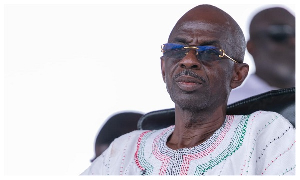A ROAD MAP TO TAX REFORM: PUTTING THE PRESIDENT’S INCOME INTO THE EQUATION
It is understood that all government functions must be authorized by the constitution of the Republic of Ghana. While this understanding may not be as firm as it is, it is fairly well acknowledged. However, some of us feel that when it comes to matters of taxation, the government should throw the constitution out the window or amend the provision dealing with the tax exempt nature of the President’s income by an act of parliament, albeit, an entrenched provision. It is also worth noting that there is growing concern among many elements of society that the President will consolidate too much economic power by receiving a tax free income.The amendment is necessary because there is no reason and rhyme as to why the President’s income should be exempted from taxes, even after he leaves office. In Chapter 8 page 56 Article 68 clauses (5) and (7) of Ghana’s constitution, it is stated that “The salary, allowances, facilities, pensions and gratuity referred to in clauses (3) and (4) shall be exempt from tax.” This provision of the constitution, invariably, contradicts the old cliché that two things are guaranteed in life- DEATH AND TAXES. I do not want to sound sanctimonious, but under the circumstances I have no choice The Bible says, in Matthew chapter 17 verse 25, that Jesus paid taxes when he left Galilee and went to Capernaum. The Commander-in Chief of the greatest democracy in the world, USA, pays taxes on his income and his tax return is then made public before the due date in April. So what prevents our President from meeting such an important obligation? Inquiring minds want to know.
When the 1992 constitution was drafted by the Consultative Assembly, the then President Rawlings was against the provision that exempts the President from paying taxes. The ex-President Rawlings is of the opinion that taxation measures should meet revenue and other public policy objectives and have regard to the principles of economic efficiency, and transparency whilst minimizing compliance and administrative costs. Furthermore, he contends that it will be very disconcerting and disingenuous for a President, whose income is exempt from taxes, to use tax policy to attempt to encourage certain behaviors deemed desirable and to discourage behaviors deemed undesirable. It is against this backdrop that President Rawlings made numerous attempts to have the aforementioned provision revised or amended. After all attempts fell through, his only recourse was to issue an administrative order making it possible for taxes to be withheld from his income.
One ambiguity in the provision is the use of the word FACILITIES. The provision did not elucidate what exactly is meant by FACILITIES, and this caveat, ultimately, is a potential recipe for tax avoidance, which is the legal utilization of the tax regime to one’ own advantage, by some individuals in the office of the President in order to avoid the amount of tax that is payable by means that are within the law. Given the level of corruption in our system it is possible that provision can be abused or utilized esoterically by some unscrupulous elements in the President’s office, as well as the President’s family and friends.
It may interest the readers to know that taxation might be one of the underlining reasons for the President to push for the currency re-denomination. Taxation not only supports the currency directly due to the need to obtain the currency in order to pay the tax, it supports it indirectly by fostering the general belief that the currency is actually worth something. After all, if the government is prepared to accept the currency it creates, and only the currency it creates, in payment of taxes then the currency must have genuine value. If the President supports a policy that affects taxation then there is the need to change the provisions of Article 68 of the constitution so that the President receives equal treatment before the tax law just like John and Jane Doe or “John and Jane Kuffour”.
Tax avoidance may be considered to be the dodging of one's duties to society; invariably the President as the Head of State, has to make his fiscal contribution to society by paying taxes on his income , .Tax avoidance also reduces government revenue and brings the tax system into disrepute, consequently the President’s income has to be taxed to enable him politicize that tax policy is the chief intersection of citizens and the nexus at which government either manipulates the economy or respect the right of citizens to deploy their earnings in a way they see fit. The obvious way to keep tax avoidance within limits is to frame tax rules so that there is no scope for avoidance. This can be achieved through introducing new legislation and amending some provisions of the existing legislation.
We can also introduce statutory rules to obviate certain types of tax avoidance, and also by making certain provisions of the tax legislation (to be known as "anti-avoidance" provisions) apply to prevent tax avoidance where the main object (or purpose), or one of the main objects (or purposes), of a transaction is to enable tax advantages to be obtained, like the importation of luxury cars and or items through the office of the President or in the name of the President. There is also the need to use judicial doctrines to prevent tax avoidance. In the United States, the Internal Revenue Service distinguishes some schemes as "abusive" and therefore illegal and refers those abusive schemes to the courts to make a determination as to the legal implications...
In summation, although unpopular, and many may argue that it is unfair, taxes are a necessity. The standard of living of a modern society demands it. The government must collect the revenues in order to provide the goods and services that their citizens need, want and demand, and that is the more reason why President ‘s salary, allowances, facilities, pension and gratuity should be taxed. The power to impose taxes on the President’s income, whether deemed direct or indirect, should be granted by an amendment of the provisions of Article 68. If the imposition of tax on the Head of State’s income is made politically feasible by constitutional amendment, it would be the crowning feature of a larger trend of legislative action meant to curb political malfeasance and the passage of convoluted legislation by parliament.















